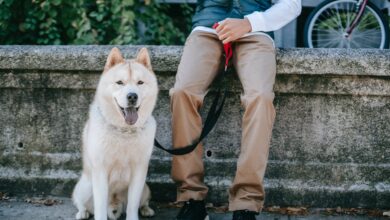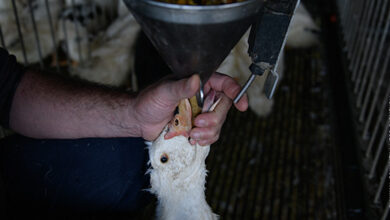What’s a Lhasa Apso’s Personality Like?

The Lhasa Apso, with its lavish coat, deep-set eyes, and dignified demeanor, is an ancient Tibetan breed with a history as fascinating as its distinct appearance. This small but hardy dog served as a sentinel in palaces and monasteries in its homeland, alerting monks to any intruders. This article delves deep into the temperament and personality of the Lhasa Apso, helping prospective owners and enthusiasts better understand this unique breed.
1. History and Origin
To truly grasp the Lhasa Apso’s temperament, it’s essential to recognize its roots. Originating in Tibet over a thousand years ago, the breed was named after Lhasa, the capital city. The word “Apso” is believed to be derived from the Tibetan word for goat, referencing their long, flowing coats similar to that of the mountain goats in the region.
2. Independent and Alert
One of the first things you’ll notice about the Lhasa Apso is its independent nature. They are thinkers, often appearing as if they’re mulling over a deep philosophical question. This independence, combined with their alertness, made them excellent watchdogs in ancient Tibet. They won’t necessarily bark at every slight noise, but if they sense something amiss, they won’t hesitate to raise the alarm.
3. Loyal to Their Families
While the Lhasa Apso might be reserved or even aloof with strangers, they are incredibly loyal and affectionate towards their families. This breed forms deep bonds with its primary caregivers and tends to be particularly attached to one family member.
4. Intelligent but Stubborn
There’s no denying the Lhasa Apso’s intelligence. They are quick learners, capable of understanding a wide array of commands and tricks. However, their independent nature can sometimes translate into stubbornness. Training a Lhasa Apso requires patience and consistency. They respond best to positive reinforcement techniques.
5. Good with Older Children
Lhasa Apsos can be a great family pet, especially with older children who understand the importance of gentle play. The breed can be a little intolerant of overly rambunctious play, so they might not be the best fit for very young children unless supervised closely.
6. Socialization is Key
For the Lhasa Apso, early and consistent socialization is vital. Exposure to a variety of experiences, people, and other animals during their formative months can help prevent them from becoming overly suspicious or aggressive in unfamiliar situations. Well-socialized Lhasa Apsos are confident and sociable dogs.
7. Adaptable to Apartment Living
Thanks to their small size, Lhasa Apsos are adaptable to apartment living. However, they are relatively active indoors and will appreciate play sessions and daily walks.
8. Potential for Dominance
Despite their small size, some Lhasa Apsos display dominant behaviors, often standing their ground with much larger dogs. While they aren’t inherently aggressive, it’s important for owners to establish leadership and set boundaries early on.
9. Grooming and Care
The Lhasa Apso’s long, flowing coat isn’t just for show—it historically protected them from the harsh Tibetan climate. However, this coat requires regular maintenance to prevent tangles and mats. Regular grooming sessions can also serve as bonding moments between the dog and the owner.
10. Health Considerations
Generally, a healthy breed, Lhasa Apsos has a few common health issues, such as eye problems and patellar luxation. Regular veterinary check-ups and a balanced diet can help ensure they live a long and healthy life.
The Lhasa Apso, a breed steeped in history and tradition, is a complex and fascinating dog. With the right training, socialization, and care, they can be loyal, loving companions. They’re best suited to families or individuals who appreciate their unique blend of independence and affection and are willing to invest time in training and socialization. In return, a Lhasa Apso offers unwavering loyalty and companionship, making them a cherished member of any household.
How Does a Male Lhasa Apso Temperament Compare to a Female Lhasa Apso?
Male Lhasa Apso Temperament:
1. Dominance and Territory
Male Lhasa Apsos often display a more dominant streak, especially if they aren’t neutered. This can manifest in behaviors like marking territory or asserting themselves with other dogs. While this trait can be managed with training, it’s important to establish firm leadership and boundaries from a young age.
2. Playfulness
Generally, male Lhasa Apsos tend to be a tad more playful and energetic, especially during their younger years. This can make them a delightful companion for families with older children who appreciate an active playmate.
3. Affection Levels
Males, once bonded with their owners, can be incredibly affectionate. They often enjoy being the center of attention and may follow their favorite human from room to room, seeking affection and companionship.
4. Size and Appearance
While not directly related to temperament, male Lhasa Apsos are usually slightly larger and may have a more robust appearance compared to females.
Female Lhasa Apso Temperament:
1. Independence
Female Lhasa Apsos are often a bit more independent than their male counterparts. They’re just as loyal and affectionate, but they might be more content spending some time on their own or resting in their favorite spot.
2. Mood Swings
Especially if not spayed, female Lhasa Apsos can experience mood swings related to their heat cycles. This can sometimes result in periods of increased clinginess or, conversely, a desire for more alone time.
3. Training
Some owners find that female Lhasa Apsos are slightly easier to train due to their slightly less dominant nature. However, as with males, consistency and positive reinforcement are key.
4. Social Dynamics
Female Lhasa Apsos can sometimes be more selective about which dogs they get along with. Introductions to other dogs, especially those of the same gender, should be done cautiously.
Regardless of gender, Lhasa Apsos are known for their loyalty, intelligence, and sometimes stubborn nature. Both males and females can make wonderful companions, provided they receive adequate training, socialization, and love.
Frequently Asked Questions about Lhasa Apso Temperament and Personality

1. What is the general temperament of a Lhasa Apso?
The Lhasa Apso is a spirited, loyal, and alert dog breed. Originally bred as sentinel dogs for Tibetan monasteries, they are naturally suspicious of strangers but warm up quickly to trusted family members, displaying affection and playfulness.
2. Are Lhasa Apsos good with children?
Lhasa Apsos can be good with children, especially if they are raised together. However, due to their small size and sometimes assertive nature, it’s essential that interactions between young children and the dog be supervised to prevent unintentional rough handling.
3. How do Lhasa Apsos react to strangers?
Being originally bred as sentinel dogs, Lhasa Apsos are naturally wary of strangers. They can be aloof or even bark when confronted with unfamiliar faces, but with proper introductions and socialization, they can become more accepting.
4. Are Lhasa Apsos easy to train?
Lhasa Apsos are intelligent but can be stubborn at times. Consistency, patience, and positive reinforcement methods work best when training them. Early socialization and puppy training classes are highly recommended.
5. Do they get along with other pets?
While Lhasa Apsos can get along with other pets, especially if raised together, their assertive nature means introductions to new animals should be done cautiously and gradually.
6. Are Lhasa Apsos known to be vocal?
Yes, Lhasa Apsos can be quite vocal. Their history as alert dogs means they’ll often bark at unfamiliar sounds or strangers. However, with training, excessive barking can be managed.
7. How independent are Lhasa Apsos?
Lhasa Apsos are known for their independent streak. While they bond closely with their families, they’re also content spending time alone and can be quite self-reliant.
8. Is the Lhasa Apso a good apartment dog?
Yes, due to their small size and moderate energy level, Lhasa Apsos can adapt well to apartment living, provided they get daily exercise and mental stimulation.
9. Are they high-energy dogs?
While Lhasa Apsos are playful and spirited, they have a moderate energy level. Daily walks and play sessions are usually enough to keep them content.
10. How are Lhasa Apsos with grooming and maintenance?
Lhasa Apsos have a long, dense coat that requires regular grooming to prevent matting. Daily brushing and occasional professional grooming are recommended.
11. Are Lhasa Apsos hypoallergenic?
No dog is entirely hypoallergenic, but the Lhasa Apso’s coat produces fewer allergens than many other breeds, making them a good choice for some allergy sufferers.
12. Does Lhasa Apsos have any specific behavioral issues?
Lhasa Apsos can exhibit behaviors like stubbornness or possessiveness over toys and food. However, with proper training and early socialization, these tendencies can be managed.
13. How do Lhasa Apsos handle being left alone?
Lhasa Apsos are fairly independent and can handle being left alone for short periods. However, extended periods of isolation can lead to separation anxiety or undesirable behaviors.
14. Are Lhasa Apsos known to be aggressive?
While Lhasa Apsos aren’t inherently aggressive, their assertive nature and suspicion of strangers can lead to defensive behaviors. Proper socialization, training, and understanding of their temperament are crucial.
15. How adaptable are Lhasa Apsos to new environments?
Lhasa Apsos are quite adaptable, provided they feel safe and secure. Introducing them gradually to new environments and ensuring consistency in their routine can make transitions smoother.
What Kind of Person Is a Good Fit for a Lhasa Apso?

The Lhasa Apso, with its regal appearance and independent spirit, is a breed that captures the hearts of many. Originating from Tibet and known for its role as a sentinel in monasteries, this breed has unique characteristics and demands. So, what kind of person would be the ideal fit for a Lhasa Apso?
1. Patient and Consistent
Lhasa Apsos are known for their independent and sometimes stubborn nature. They’re intelligent, but they like to do things on their own terms. A person who is patient and consistent in their training approach will fare best with this breed. It’s essential to establish leadership while also respecting the dog’s individuality.
2. Appreciates Loyalty
For those who value a loyal companion, the Lhasa Apso is a perfect match. Once they form a bond with their owner, it’s unbreakable. They might be aloof or wary of strangers, but to their family, they offer unwavering affection and devotion.
3. Understand the Need for Socialization
Given their history as sentinel dogs, Lhasa Apsos can be suspicious of unfamiliar faces. An owner who understands the value of early and consistent socialization will help the Lhasa develop into a well-rounded dog. Exposing them to different environments, people, and other pets from a young age is crucial.
4. Committed to Grooming
The Lhasa Apso’s luxurious coat isn’t just for show—it requires regular maintenance. Someone willing to invest time in daily brushing and occasional professional grooming sessions would be ideal. This not only ensures the dog looks its best but also helps prevent potential health issues related to skin infections or matted fur.
5. Living in Smaller Spaces
Lhasa Apsos is well-suited for apartment living. Their moderate energy levels mean they don’t require a large backyard, though they still appreciate regular walks and play sessions. Individuals or families living in apartments or smaller homes might find the Lhasa Apso to be the perfect companion.
6. Enjoys Close Companionship (But Respects Independence)
While Lhasa Apsos cherish their independence, they also thrive on companionship. They’re happiest when they’re with their loved ones, even if it’s just lounging on the couch. Someone who enjoys close bonds with their pets but doesn’t necessarily need a dog to be by their side every moment would be a great fit.
7. Experienced Dog Owner
While not a strict requirement, those with prior dog ownership experience might find it easier to navigate the Lhasa Apso’s unique temperament. Their assertiveness can be a lot to handle for a first-time dog owner, but for someone familiar with dog behavior, it’s just another aspect of their rich personality.
Lhasa Apso is a breed full of character and love. While they’re not the right fit for everyone, for those who appreciate their unique temperament and are willing to invest in their care, the bond formed with a Lhasa Apso is unparalleled. They’re not just pets; they become a cherished member of the family.




